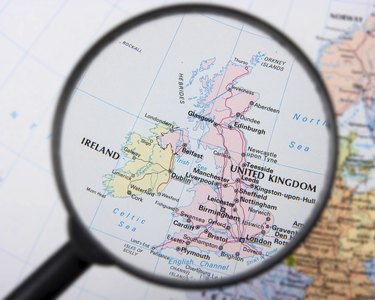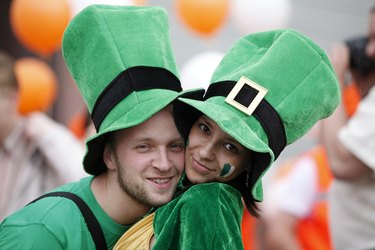
The history of America has been intertwined with that of England since the first Colonists settled in Jamestown, Virginia, in 1607, 100 years before Great Britain was even founded. Both the United States and Great Britain have holidays that are unique and specific to their respective cultures. But they also share several common holidays, although they are not always celebrated in the same manner with the same traditions.
Distinctions Between Holidays
Video of the Day

Both countries recognize public, non-working holidays during which non-essential governmental entities and many businesses are closed for national observance. Although they are not legally obligated to do so in either country, many private businesses give employees extra compensation or the day off. If public holidays fall on a weekend, they are typically observed on the preceding Friday or following Monday. Many citizens in both countries also celebrate non-public, unofficial holidays, which -- like Mother's Day and Valentine's Day -- are the same day of the calendar in both Britain and America.
Video of the Day
American Holidays

Federal law establishes 10 public holidays in the United States. They are: New Year's Day on Jan. 1; the birthday of Martin Luther King Jr., Jan. 20; Washington's Birthday -- often unofficially called President's Day -- on Feb. 17; Memorial Day, celebrated on May 26; Independence Day on July 4; Labor Day, Sept. 1; Columbus Day, celebrated on Oct. 13; Veterans Day, Nov. 11; Thanksgiving Day, fourth Thursday of November; and Christmas Day on Dec. 25.
The British Holiday System

The United Kingdom observes public holidays -- or Common law holidays -- as well as "bank holidays," in which banks and businesses close for the day. Bank holidays can be determined by Royal proclamation or by statute. The UK consists of the countries of England, Wales, Northern Ireland and Scotland. Some holidays are shared by all four countries, while others are observed by just England and Wales, and others still by only Scotland or Northern Ireland.
Holidays in Great Britain

Great Britain's combined holidays consist of: New Year's Day on Jan. 1; 2nd January on Jan. 2; St. Patrick's Day, celebrated on March 17; Good Friday on April 3; Easter Monday on April 6; Early May Bank Holiday on May 4; Spring Bank Holiday on May 5; Battle of the Boyne -- also called Orangemen's Day -- on July 12; Summer Bank Holiday on Aug. 31; St. Andrew's Day on Nov. 30; Christmas Day on Dec. 25; and Boxing Day on Dec. 26.